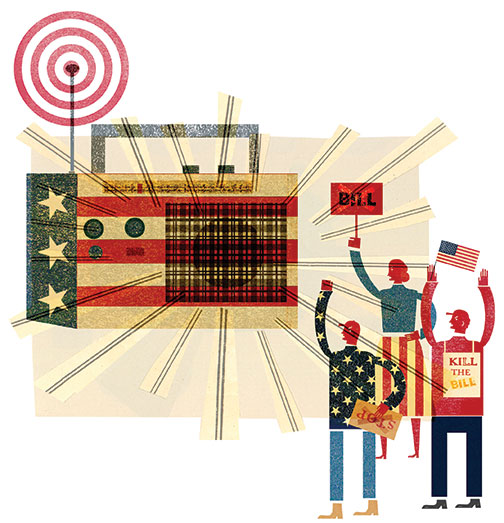
Right-wing radio has encouraged democratic participation—while undermining governance.
By Brian Rosenwald
To consume conservative media in 2019 is to behold a constant parade of Donald Trump W’68’s staunchest defenders bellowing about witch hunts.
But while this crystalizes the symbiotic relationship that has arisen between conservative media and the Republican Party over the past 30 years, the impact of right-wing outlets has gone far beyond partisan politics. Led by talk radio, they have had a transformative influence on the legislative process. They are a leading reason that immigration remains an intractable and contentious issue a full two decades after bipartisan legislative reform efforts began. And their influence even reaches into surprisingly arcane areas of governance, in ways that imperil the sustainability of America’s republican system of self-government.
If you were to pinpoint the moment when talk radio hosts flipped the script on congressional business as usual, you could do worse than the fall of 1994, when conservative media jumped into several small legislative battles, including a Federal Communications Commission (FCC) initiative to incentivize the development of cellular telephone systems. This was the sort of dense policy debate that the mainstream press invariably left to Washington insiders, but that talk radio hosts transformed into a referendum on bedrock principles.
The FCC had announced a plan to award “pioneer preferences,” which included free licenses, to developers of breakthrough communications technologies. But as the FCC was awarding licenses to three companies, Congress enacted a statute requiring the Commission to instead auction licenses to the highest bidder. When Congress moved on a bipartisan basis to make the three pioneer licensees pay roughly 90 percent of the market rate—still a discount, but not a free ride—for their licenses, the FCC followed suit, prompting a lawsuit from the companies.
Energy and Commerce Committee Chairman John Dingell worried that if the licensees won their suit they’d pay nothing at all, so he continued to press his bipartisan legislation, attaching it to an important trade bill. When the Washington Post, whose parent company owned 70 percent of one of the licensees, ran an editorial in favor of that trade bill, a competitor bought ads in both the Post and the Washington Times flaying the Post for the editorial’s failure to disclose the paper’s financial interest in the passage of the legislation.
That’s what lured talk radio into the fray. The medium’s intimacy, which fostered deep bonds between hosts and listeners who spent hours together each week, enabled the story to catch fire on the airwaves in ways it could never do in newsprint.
Dingell’s bill intended to ensure that the pioneer companies paid something; but for conservative broadcasters, who cared little about the actual substance of the matter, it was something very different. The airwaves were ablaze about the idea that the Post was deceptively trying to win a government handout. The story fit perfectly with one of the regular themes in talk radio’s soap opera: a liberal media in bed with Democrats. While the details of pioneer preferences might have put the public to sleep, listeners could easily comprehend cronyism and media bias.
Hosts stirred up a hornet’s nest that stalled the trade bill until after the midterm elections, and necessitated a side deal between President Clinton and Republican Senate Leader Robert Dole on the pioneer preference issue to ensure its passage.
And this imbroglio wasn’t unique. Any issue that could fit into a broader talk radio theme was ripe for exploitation. The pioneer preference case highlighted how talk radio had the biggest impact when it sunk its teeth into small policy matters that typically generated little mainstream media coverage or attention from the public. That lack of visibility meant that most of the calls, faxes, and later emails that legislators received on an issue might well come from talk radio fans angry about the legislation.
That reshaped the political calculus for congressional representatives. When members faced key votes on policies that implicated their core convictions, they followed their instincts. But in other cases, talk radio spurred activism turned minor bills into high-stakes purity tests. If you were a back-bencher, why risk angering the only group of voters who seemed to care about relatively minor legislation? If you were part of the leadership, why ask members to take a tough vote on something that few Americans were paying attention to, and angry conservative media consumers were railing against?
These sorts of calculations, combined with political dynamics like geographic polarization and gerrymandering—which amplify the threat of primary challenges to legislators who don’t toe the most partisan line—made conservative media a powerful force in the legislative process.
If ever a moment seemed ripe for immigration reform, it was 2007. The year before, the Senate had passed a bipartisan bill with more than the 60 votes necessary to cut off a filibuster. House Republicans refused to take it up, preferring to use the issue as a political weapon in the midterm election campaign. But Democrats scored big victories that November, and the Senate went back to work—with the Bush White House on board.
Legislation seemed likely when Senate negotiators cut a deal, but the bill ran into a talk radio buzzsaw. Most major national hosts excoriated the bill in hyperbolic terms, with Michael Savage, to name but one, threatening that senators who supported the effort would find themselves deported from office. According to a Pew study during the crucial month of Senate debate, talk radio hosts devoted a full 23 percent of their airtime to savaging the immigration bill. One day of talk radio–driven activism even shut the Senate switchboard down. As the legislation started to flounder, the cause was clear to senators. Talk radio was “running America,” in the words of Republican Senator Trent Lott. “We have to deal with that problem.”
The result was an ignominious defeat for President Bush and bipartisan deal-making.
When these efforts resumed after a five-year gap in late 2012, key senators had learned from the failings of 2007. They courted Rush Limbaugh and Fox News chief Roger Ailes, attempting to at least get their perspective out on the airwaves, if not to win over conservative media entirely. But conservative media had expanded, and new even more strident hosts like Mark Levin, along with the vehemently anti-immigration publication Breitbart, stoked the opposition even as the senators courted the biggest figures in conservative media.
The Senate actually passed a bill. But reform floundered in the House. The final nail in the coffin came when Republican House Majority Leader Eric Cantor lost a primary election to a little known economics professor. While many factors played into Cantor’s loss, conservative hosts like Levin, who had campaigned for his opponent and emphasized opposition to immigration reform, declared victory. Fearing that they were right, the House Republican majority simply wasn’t willing to take another chance.
Conservative media can’t topple every bill, especially when Democrats control government, nor has it had much success in forcing legislation into the statute books (as opposed to keeping it out). But talk radio—and its cable-news and digital progeny—have become powerful forces in the legislative process.
This power isn’t all bad for American democracy. Hosts have enough airtime per week to spotlight policy topics that might otherwise get ignored. They can also peel back the curtain on Capitol Hill and make a complicated process understandable, while enabling a segment of Americans to engage the legislative process.
But too often the top priority for conservative media—the bottom line—dictates hyperbolic and distorted portrayals of legislation, jamming complex policy topics into a soap opera of good versus evil. The impact of conservative media also twists the feedback legislators receive, such that majority wishes sometimes get drowned out by a vocal, engaged minority. Finally and most importantly, conservative media often make the hard, but necessary, compromises demanded by self-government far more difficult, if not impossible.
So while talk radio has encouraged democratic participation, simultaneously it has fed a process through which a smaller and smaller segment of voters dominate American politics. Abetted by the Republican Party it eventually took over, talk radio invited uncompromising conservatives to the table but at the expense of many other voices too often now marginalized or no longer heard.
Brian Rosenwald C’06 is author of Talk Radio’s America: How an Industry Took Over a Political Party That Took Over the United States (Harvard University Press, 2019).





I challenge the expertise of one who identifies Mr.’s Clinton and Bush with the title of their former position, yet denies that courtesy to the current executive of the Oval Office.